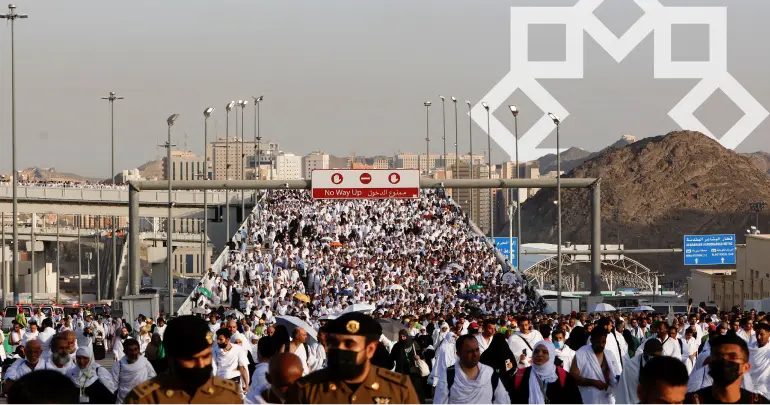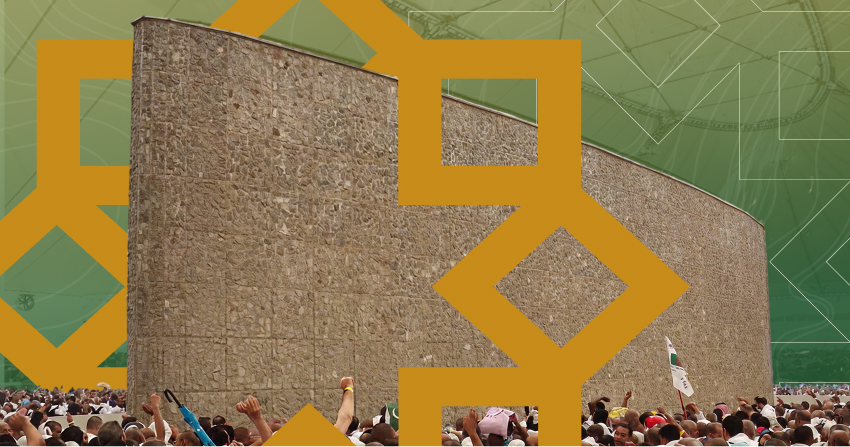Hajj and Its Connection to the Stories of the Prophets
Hajj is one of the five pillars of Islam. It is a sacred pilgrimage that every Muslim who is physically and financially able is encouraged to make at least once in their lifetime. But it is far more than just travelling to Makkah. Hajj is a powerful walk through history that echoes the footsteps of the Prophets and brings their timeless stories to life.
Each ritual, from circling the Kaaba to standing on the plains of Arafat and stoning the Jamarat, connects us to the trials, sacrifices, and unwavering faith of those who came before us. These are not just events from the past. They are living lessons in devotion, trust, and resilience.
Even here in the UK, where not everyone has the chance to go for Hajj, the spirit of the pilgrimage still resonates. It inspires us to reflect on our own path, to give generously, fulfil our Zakat, and show compassion. These are values deeply rooted in the lives of the Prophets and carried forward through every act of kindness.
The Story of Prophet Ibrahim (AS): The Foundation of Hajj
The rituals of Hajj are not just symbolic actions. Each step tells a story, and at the heart of that story is the remarkable journey of Prophet Ibrahim (AS). His strong faith, sincere devotion, and complete trust in Allah laid the foundations of many rituals millions of Muslims perform during Hajj today.
The essence of Hajj is deeply rooted in the story of Prophet Ibrahim (AS), a figure known for his complete submission to Allah’s will. His journey is one of devotion and sacrifice, and these values continue to inspire Muslims around the world.
When Allah commanded Ibrahim (AS) to leave his wife Hajar and their infant son Ismail in the barren desert, he obeyed without question. It was a test of faith that led to the miracle of Zamzam and the footsteps of Hajar, now honoured in the ritual of Sa’i.
Later, Ibrahim (AS) saw a dream in which he was commanded to sacrifice his son. Though it was the ultimate test, he prepared to obey. Just as he was about to carry it out, Allah replaced Ismail (AS) with a ram. It was a powerful reminder that true sacrifice lies in intention and obedience.
This moment is commemorated every year during Hajj and Eid al-Adha through the act of Qurbani. But the legacy of Ibrahim (AS) doesn’t end there. He and his son Ismail (AS) built the Kaaba, the sacred structure, as a house of worship. The ritual of Tawaf, where pilgrims walk around the Kaaba, is a symbol of our connection to their devotion and a reminder to centre our lives around the worship of Allah.
The spirit of Hajj is not just about the physical journey. It is about living with purpose, giving with sincerity and trusting in Allah’s plan, even when we don’t see the full picture.

The Story of Hajar (AS): Trusting in Allah’s Provision
Few stories capture the spirit of faith and perseverance quite like that of Hajar (AS), the wife of Prophet Ibrahim (AS). When Ibrahim (AS) left Hajar and their son, Ismail (AS), in the desert, she faced an incredibly difficult trial. With no food or shelter, she ran between the hills of Safa and Marwah, searching desperately for water. She relied solely on her trust in Allah, and from that moment of struggle came a miracle: the Zamzam well, which still flows today, quenching the thirst of millions.
The Sa’i ritual during Hajj, in which pilgrims run or walk seven times between Safa and Marwah, commemorates Hajar’s perseverance and trust in Allah. Each step reminds us that even in moments of despair, we should not lose hope. Allah’s mercy is always present, and He provides for us in ways we cannot imagine, just as He did for Hajar (AS) and Ismail (AS).
But Hajar’s story is not just for pilgrims. It echoes in the lives of countless mothers around the world today, walking long distances just to find clean water for their families.
Supporting clean water projects through your Zakat or Sadaqah is one way to honour Hajar’s legacy. Whether it is in Palestine, Afghanistan or other regions in need, your donation can help provide the mercy of clean water just as Allah once provided for Hajar and her child.
The Story of Prophet Ismail (AS): The Legacy of Sacrifice
Prophet Ismail (AS), the beloved son of Ibrahim (AS) and Hajar (AS), holds a deeply meaningful place in the story of Hajj. When his father saw in a dream that he must sacrifice his son, Ismail (AS) did not hesitate. He calmly responded,
“Do what you are commanded. You will find me, if Allah wills, of the steadfast” – Surah As-Saffat (37:102)
This was an act of complete trust and submission to Allah’s will, as he encouraged his father to fulfil the divine command with patience. His words show a remarkable level of faith, trust and maturity, even at such a young age.
This moment in history reminds us that true obedience and reliance on Allah are not reserved for adults. They can live strongly in the hearts of the young too.
During Hajj, the Stoning of the Jamarat, where pilgrims throw pebbles at three pillars, symbolises our rejection of temptation. It echoes the moment when the devil tried to lead Ibrahim (AS) away from Allah’s path. It is a physical act that symbolises standing firm against temptation and choosing what’s right, even when it’s hard.
The story of Ismail (AS) and the rituals of Hajj go hand in hand, teaching us the power of sacrifice, patience and unshakable faith. And today, when we donate to charity, sponsor a child or support education projects, we are helping build that same strength in the next generation. It is a way of passing on the values that have guided Muslims for centuries: faith, resilience and trust in Allah’s plan.
The Story of Prophet Muhammad (peace be upon him): The Perfect Example
The most significant connection to Hajj lies in the pilgrimage of the Prophet Muhammad (peace be upon him). In the 10th year of the Hijrah, he performed the Farewell Pilgrimage, during which he delivered his famous speech that summarised the core principles of Islam. He spoke of unity, equality, and justice, urging the Muslim community to treat one another with kindness, compassion, and respect.
The Prophet’s (peace be upon him) journey to Makkah was not just a physical pilgrimage; it was a profound emotional and spiritual milestone for the Ummah. His teachings during this Hajj continue to resonate deeply today, reminding us that the true spirit of Hajj goes beyond physical rituals; it is about the transformation within our hearts.
No discussion of Hajj would be complete without recalling the words of our beloved Prophet Muhammad (peace be upon him), who, during his final pilgrimage, conveyed a powerful message to the Muslim Ummah. Standing on the plains of Arafah, he said,
“All mankind is from Adam and Eve, an Arab has no superiority over a non-Arab nor a non-Arab has any superiority over an Arab; also, a white has no superiority over black nor a black has any superiority over white except by piety and good action.”
A beautiful reminder that no one is better than another; we are all equal in the eyes of Allah. Islam teaches that race, colour, and background hold no value in determining one’s worth. What truly matters is our faith, our actions, and the goodness within our hearts.
His Farewell Hajj speech remains a guiding light for us all. When you donate to charity, support global relief efforts, or give zakat to a trusted organisation like United Muslims, you are helping to carry forward his message of equality, unity, and compassion.
Step into the legacy of the Prophets. Your Zakat can change lives and inspire others.
Donate your zakat
Fulfil your obligation today – give Zakat and be a source of hope for those in need!
The Connection Between Prophetic Stories and the Hajj Experience
Hajj is more than just a journey. Each step of the pilgrimage connects us to the stories of our beloved Prophets. Through every ritual, we are given a moment to pause and reflect on their patience, sacrifice, unwavering faith, and deep trust in Allah.
It is a powerful reminder that Islam is not only about rituals. It is a complete way of life, shaped and perfected by the examples of the Prophets. As we walk in their footsteps, we are not just honouring their legacy. We are learning how to carry those same values in our own lives, with sincerity and purpose.
What The Hajj Stories Mean for Us in the UK
You might not be walking through the desert or performing Hajj this year, but these stories still belong to you. They serve as a deep reminder to act with compassion, to trust in Allah, and to give when others are in need.
Each ritual of Hajj connects us to the legacy of the Prophet’s sacrifice, patience, and unwavering faith. Even from home, we can reflect on these lessons and find ways to live them out in our everyday lives.
At United Muslims, we help bring these values to life through every donation for Palestine, every Zakat contribution, every food parcel delivered, every child given the chance to learn, and every drop of clean water provided.
Bringing hope through small acts of kindness—a meal, a helping hand, or a gift can light up a child’s day.
Embracing the Legacy of the Prophets
As we approach Hajj, it is a time to reflect on the lives of the Prophets whose stories are the foundation of our faith. Their lessons of submission, sacrifice, and trust in Allah guide us, especially during this pilgrimage.
Giving is an act of submission, just as the Prophets did before us. Whether it is Zakat, sponsoring a child, or supporting a water project, your intention brings blessings. As the Quran says:
“The example of those who spend their wealth in the way of Allah is like a seed [of grain] which grows seven spikes; in each spike is a hundred grains.” (Qur’an 2:261)
Hajj reminds us to honour the Prophets’ faith and resilience through our actions. Whether you’re in Manchester, Birmingham, or Bradford, you can continue their legacy by donating and spreading compassion.
